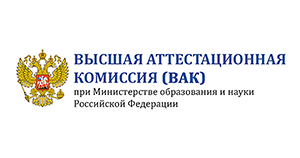|
Перейти
на сайт журнала "Врач" |
Перейти на сайт журнала "Медицинская сестра"
|
Перейти на сайт журнала "Фармация"
|
Перейти на сайт журнала "Молекулярная медицина"
|
Перейти на сайт журнала "Вопросы биологической, медицинской и фармацевтической химии"
|
Журнал включен в российские и международные библиотечные и реферативные базы данных
|
ВАК (Россия)
|
РИНЦ (Россия)
|
Эко-Вектор (Россия)
|
DIPEPTIDE BDNF MIMETIC GSB-106 PREVENTS DEPRESSION-LIKE BEHAVIOR AND COGNITIVE IMPAIRMENT CAUSED BY ISCHEMIC STROKE IN RATS
DOI: https://doi.org/10.29296/25877313-2022-02-08
Issue:
2
Year:
2022
Relevance. Depression and cognitive impairment are common complications of acute cerebrovascular accidents. Disorders of hippocampal neuro-plasticity associated with a decrease in BDNF expression are considered as one of the causes of these complications. A dimeric dipeptide mimetic of the BDNF loop 4, (bis (N-monosuccinyl-L-seryl-L-lysine) hexamethylenediamide) (GSB-106) was created at the V.V. Zakusov Research Institute of Pharmacology. GSB-106 demonstrated antidepressant, neuroprotective and neuroregenerative properties in in vivo experiments. Objective. Experiments were performed on 40 male rats Wistar weighing 240–280 g. Purpose of the study is to investigate the effect of GSB-106 on depression-like behavior and memory impairments in rats induced by middle cerebral artery occlusion (MCAO). Material and methods. GSB-106 was injected intraperitoneally at a dose of 0.1 mg/kg for 21 days after surgery. Depressive-like behavior was de-tected in the forced swimming test, and memory impairments – in the novel object recognition test. Conclusions. GSB-106 is a promising compound for further development as a drug for the treatment of post-stroke depression and cognitive impair-ment.
Keywords:
dipeptide mimetic
BDNF
GSB-106
experimental stroke
depression
memory
References:
- Dafer R.M., Rao M., Shareef A., Sharma A. Poststroke depression. Top Stroke Rehabil. 2008; 15(1): 13-21.
- Hénon H., Pasquier F., Leys D. Poststroke Dementia. Cerebrovasc Dis. 2006; 22: 61-70.
- Shishkina G.T., Kalinina T.S., Guljaeva N.V. i dr. Izmenenie jekspressii genov i nejrovospalenie v gippokampe posle fokal’noj ishemii mozga: uchastie v indukcii dlitel’nyh kognitivnyh i psihojemocional’nyh narushenij. Biohimija. 2021; 86(6): 805-815.
- Zhang E., Liao P. Brain-derived neurotrophic factor and post-stroke depression. J. Neurosci. Res. 2020; 98(3): 537-548.
- Chen H.H., Zhang N., Li W.Y., et al. Overexpression of brain-derived neurotrophic factor in the hippocampus protects against post-stroke depression. Neural. Regen. Res. 2015; 10(9): 1427-1432.
- Luo L., Li C., Du X., et al. Effect of aerobic exercise on BDNF/proBDNF expression in the ischemic hippocampus and depression recovery of rats after stroke. Behav. Brain. Res. 2019; 362: 323-331.
- Hong M., Kim M., Kim T.W., et al. Treadmill exercise improves motor function and short-term memory by enhancing synaptic plasticity and neurogenesis in photo-thrombotic stroke mice. Int. Neurourol. J. 2020; 24(1): 28-38.
- Gudasheva T.A., Povarnina P.Y., Tarasiuk A.V., Seredenin S.B. Low-molecular mimetics of nerve growth factor and brain-derived neurotrophic factor: Design and pharmacological properties. Med. Res. Rev. 2021; 41: 2746-2774.
- Povarnina P.Ju., Nikiforov D.M., Kotel’nikova S.O. i dr. Nootropnaja aktivnost’ dipeptidnogo mimetika mozgovogo nejrotroficheskogo faktora GSB-106. Voprosy bio-logicheskoj, medicinskoj i farmacevticheskoj himii. 2020; 23(1): 16−22.
- Povarnina P.Ju. Nejroprotektornaja aktivnost’ dipeptidnyh mimetikov BDNF, po-raznomu aktivirujushhih soprjazhennye s TRKB puti transdukcii signala, v uslo-vijah jeksperimental’nogo ishemicheskogo insul’ta. Jeksperimental’naja i klinicheskaja farmakologija. 2020; 83(12): 8-12.
- Gudasheva T.A., Tarasjuk A.V., Pomogajbo S.V. i dr. Dizajn i sintez dipeptidnyh mimetikov mozgovogo nejrotroficheskogo faktora. Bioorganicheskaja himija. 2012; 38(3): 280-290.
- Uluç K., Miranpuri A., Kujoth G.C., et al. Focal cerebral ischemia model by endovascular suture occlusion of the middle cerebral artery in the rat. J. Vis. Exp. 2011; 48: 1978.
- Gudasheva T.A., Povarnina P.Y., Antipova T.A., et al. Neuroregenerative activity of the dipeptide mimetic of Brain Derived Neurotrophic Factor GSB-106 under ex-perimental ischemic stroke. CNS Neurol. Disord. Drug. Targets. 2021.
- Ennaceur A., Delacour J. A new one-trial test for neurobio-logical studies of memory in rats. 1: Behavioral data. Behav. Brain. Res. 1988; 31(1): 47-59.
- Beldjoud H., Barsegyan A., Roozendaal B. Noradrenergic activation of the basolateral amygdala enhances object recognition memory and induces chromatin remod-eling in the insular cortex. Front. Behav. Neurosci. 2015; 9: 108.
- Porsolt R.D., Anton G., Blavet N., Jalfre M. Behavioural despair in rats: A new model sensitive to antidepressant treat-ments. Eur. J. Pharmacol. 1978; 47(4): 379-391.
- Kawai H., Kodaira N., Tanaka C., et al. Time of Administration of acute or chronic doses of imipramine affects its antidepressant action in rats. J. Circadian. Rhythms. 2018; 16: 5.
- El-Tamawy M.S., Abd-Allah F., Ahmed S.M., et al. Aerobic exercises enhance cognitive functions and brain derived neurotrophic factor in ischemic stroke patients. NeuroRehabilitation. 2014; 34(1): 209-213.
- Gudasheva T.A., Povarnina P.Y., Seredenin S.B. Dipeptide mimetic of the brain-derived neurotrophic factor prevents impairments of neurogenesis in stressed mice. Bull. Exp. Biol. Med. 2017; 162(4): 454-457.








